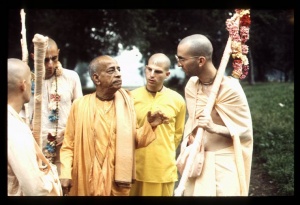CC Antya 11.30 (1975): Difference between revisions
(Vanibot #0027: CCMirror - Mirror CC's 1996 edition to form a basis for 1975) |
(Vanibot #0020: VersionCompareLinker - added a link to the Version Compare feature) |
||
| Line 2: | Line 2: | ||
<div style="float:left">'''[[Sri Caitanya-caritamrta (1975)|Śrī Caitanya-caritāmṛta (1975)]] - [[CC Antya (1975)|Antya-līlā]] - [[CC Antya 11 (1975)|Chapter 11: The Passing of Haridāsa Ṭhākura]]'''</div> | <div style="float:left">'''[[Sri Caitanya-caritamrta (1975)|Śrī Caitanya-caritāmṛta (1975)]] - [[CC Antya (1975)|Antya-līlā]] - [[CC Antya 11 (1975)|Chapter 11: The Passing of Haridāsa Ṭhākura]]'''</div> | ||
<div style="float:right">[[File:Go-previous.png|link=CC Antya 11.29 (1975)|Antya-līlā 11.29]] '''[[CC Antya 11.29 (1975)|Antya-līlā 11.29]] - [[CC Antya 11.31 (1975)|Antya-līlā 11.31]]''' [[File:Go-next.png|link=CC Antya 11.31 (1975)|Antya-līlā 11.31]]</div> | <div style="float:right">[[File:Go-previous.png|link=CC Antya 11.29 (1975)|Antya-līlā 11.29]] '''[[CC Antya 11.29 (1975)|Antya-līlā 11.29]] - [[CC Antya 11.31 (1975)|Antya-līlā 11.31]]''' [[File:Go-next.png|link=CC Antya 11.31 (1975)|Antya-līlā 11.31]]</div> | ||
{{CompareVersions|CC|Antya 11.30|CC 1975|CC 1996}} | |||
{{RandomImage}} | {{RandomImage}} | ||
==== TEXT 30 ==== | ==== TEXT 30 ==== | ||
| Line 11: | Line 10: | ||
<div class="verse"> | <div class="verse"> | ||
:aneka nācāilā more prasāda kariyā | :aneka nācāilā more prasāda kariyā | ||
:viprera śrāddha-pātra khāinu | :viprera śrāddha-pātra khāinu 'mleccha' hañā | ||
</div> | </div> | ||
| Line 18: | Line 17: | ||
<div class="synonyms"> | <div class="synonyms"> | ||
aneka—in many ways; nācāilā—You have made dance; more—me; prasāda kariyā—by Your mercy; viprera—of the brāhmaṇas; śrāddha-pātra—the dish of the śrāddha ceremony; khāinu—I have eaten; mleccha hañā—although born in a family of | aneka—in many ways; nācāilā—You have made dance; more—me; prasāda kariyā—by Your mercy; viprera—of the brāhmaṇas; śrāddha-pātra—the dish of the śrāddha ceremony; khāinu—I have eaten; mleccha hañā—although born in a family of meateaters. | ||
</div> | </div> | ||
| Line 25: | Line 24: | ||
<div class="translation"> | <div class="translation"> | ||
"My dear Lord, by Your mercy You have made me dance in many ways. For example, I was offered the śrāddha-pātra that should have been offered to first-class brāhmaṇas. I ate from it even though I was born in a family of meateaters. | |||
</div> | </div> | ||
| Line 32: | Line 31: | ||
<div class="purport"> | <div class="purport"> | ||
Śrīla Bhaktisiddhānta Sarasvatī Ṭhākura, in his Anubhāṣya, quotes from the Viṣṇu-smṛti in reference to | Śrīla Bhaktisiddhānta Sarasvatī Ṭhākura, in his Anubhāṣya, quotes from the Viṣṇu-smṛti in reference to śrāddha-pātra. | ||
:brāhmaṇāpasadā hy ete | |||
:kathitāḥ paṅkti-dūṣakāḥ | |||
:etān vivarjayed yatnāt | |||
:śrāddha-karmaṇi paṇḍitaḥ | |||
According to this verse, if one is born in a brāhmaṇa family but does not behave according to brahminical standards, he should not be offered the śrāddha-pātra, which is prasāda offered to the forefathers. Advaita Ācārya offered the śrāddha-pātra to Haridāsa Ṭhākura, not to a brāhmaṇa who had been born in a brāhmaṇa family. Although Haridāsa Ṭhākura was born in the family of meateaters, because he was an advanced devotee he was shown more respect than a first-class brāhmaṇa. | |||
According to this verse, if one is born in a brāhmaṇa family but does not behave according to brahminical standards, he should not be offered the śrāddha-pātra, which is | |||
</div> | </div> | ||
Latest revision as of 21:09, 26 January 2020

A.C. Bhaktivedanta Swami Prabhupada
TEXT 30
- aneka nācāilā more prasāda kariyā
- viprera śrāddha-pātra khāinu 'mleccha' hañā
SYNONYMS
aneka—in many ways; nācāilā—You have made dance; more—me; prasāda kariyā—by Your mercy; viprera—of the brāhmaṇas; śrāddha-pātra—the dish of the śrāddha ceremony; khāinu—I have eaten; mleccha hañā—although born in a family of meateaters.
TRANSLATION
"My dear Lord, by Your mercy You have made me dance in many ways. For example, I was offered the śrāddha-pātra that should have been offered to first-class brāhmaṇas. I ate from it even though I was born in a family of meateaters.
PURPORT
Śrīla Bhaktisiddhānta Sarasvatī Ṭhākura, in his Anubhāṣya, quotes from the Viṣṇu-smṛti in reference to śrāddha-pātra.
- brāhmaṇāpasadā hy ete
- kathitāḥ paṅkti-dūṣakāḥ
- etān vivarjayed yatnāt
- śrāddha-karmaṇi paṇḍitaḥ
According to this verse, if one is born in a brāhmaṇa family but does not behave according to brahminical standards, he should not be offered the śrāddha-pātra, which is prasāda offered to the forefathers. Advaita Ācārya offered the śrāddha-pātra to Haridāsa Ṭhākura, not to a brāhmaṇa who had been born in a brāhmaṇa family. Although Haridāsa Ṭhākura was born in the family of meateaters, because he was an advanced devotee he was shown more respect than a first-class brāhmaṇa.